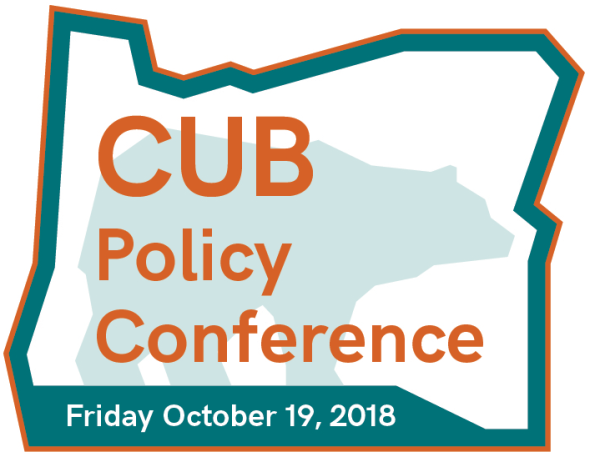CUB Conference Preview: The Role of Gas in a Decarbonized World
Posted on October 9, 2018 by Will Gehrke
Tags, Conference & Events

CUB’s eighth annual Energy Policy Conference, Destination: Decarbonization is quickly approaching on October 19 at the Downtown Portland Hilton. Online registrations (and refunds) are available until 12:00pm (noon) on Tuesday October 16 – only a week away! The CUB Blog is featuring previews of each of our six breakout panels, and some questions and issues attendees can expect to discuss. The final topic in this preview series is the panel The Role of Gas in a Decarbonized World, which will be moderated by CUB Economist Will Gehrke. The Oregon Legislature is pondering how to decarbonize Oregon’s economy. This panel will focus on decarbonizing the natural gas system.
Why should the natural gas system be decarbonized? Electrification of Oregon’s energy system is already occurring. When trying to decarbonize the economy, why should natural gas be used instead of wind and solar generation? However, it is difficult to entirely decarbonize the economy using electricity. 25 percent of Oregon’s natural gas is currently used to generate electricity, therefore gas is significantly integrated into the electrical system. Additionally, some industrial processes such as industrial dehumidification and fertilizer production depend on natural gas.
The Oregon Legislature recently passed SB 334, which tasked the Oregon Department of Energy to provide the Legislature with an evaluation of the potential for renewable natural gas in Oregon. The resulting report determined that 22 percent of Oregon’s natural gas can be produced using renewable natural gas. Several different technologies will factor into this panel such as biogas, renewable hydrogen, and biomethane. Panelists will discuss the virtues and disadvantages of these technologies.
While there are numerous technologies emerging for natural gas, who is going to purchase these products? There are currently two potential markets for renewable natural gas. The first market is firm natural gas service (i.e. heating and cooking). Residential customers are currently not allowed to purchase renewable natural gas directly from the utilities. At the moment, renewable gas is significantly more expensive than conventional gas, which has been rendered much cheaper in recent years by the practice of fracking. Under current market conditions, introducing renewable natural gas infrastructure into Oregon’s system would increase the cost of residential gas bills.
The other potential market is transportation. While the firm gas market has not been able to sell renewable gas, the transportation fuel has exploded in the west; there is particularly strong demand in Oregon and California. Since 2014, the volume of the transportation renewable gas fuel market has increased ten-fold. Natural gas powered vehicles can present a more environmental form of transportation. However, the fueling network for natural gas is limited. Gas stations are widely dispersed across Oregon, but natural gas fuel stations remain limited.
There are many barriers to renewable natural gas; comparative cost is one of the biggest ones. CUB believes that climate change is an essential problem facing the globe. The Oregon Legislature needs to have a diversity of tools to decarbonize Oregon’s economy. Renewable natural gas may be such one tool. Decarbonizing the natural gas system will help to immediately address global warming.
Panelists joining me for this discussion include Daniel Avery, Senior Policy Analyst at the Oregon Department of Energy; Adam Capage, Vice President of Corporate and Government Affairs for 3Degrees; Ken Dragoon, Principal of Flink Energy Consulting; and Bill Edmonds, Director of Environmental Management and Sustainability at NW Natural.
CUB is offering Continuing Legal Education (CLE) credits for this conference for attorneys practicing in Oregon and Washington (attorneys seeking CLE credit must sign the CLE sign-in form at the registration table upon check-in.) Follow conference news by joining the CUB email list, on our blog, and on Twitter using the hashtag #CUBCon18. And don’t forget to register now!
To keep up with CUB, like us on Facebook and follow us on Twitter!




10/09/18 | 0 Comments | CUB Conference Preview: The Role of Gas in a Decarbonized World